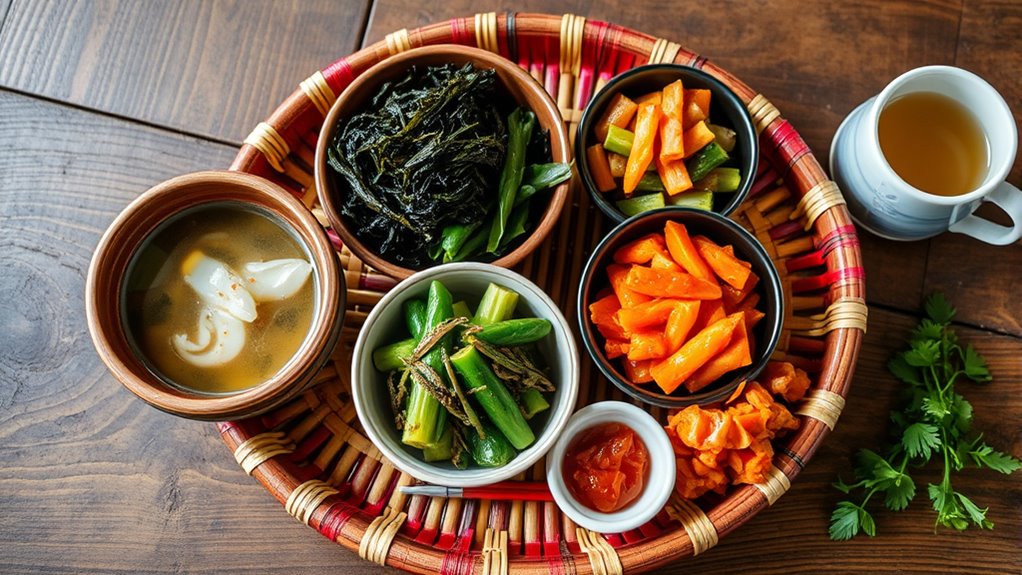To practice sustainable eating from different cultures, focus on respecting natural resources and minimizing waste. Embrace Japan’s *mottainai* concept by valuing leftovers and reducing excess. Follow India’s tradition of plant-based diets, and pick seasonal, local produce like in the Mediterranean diet. Learn from indigenous practices that emphasize ecological harmony and sustainable sourcing. Exploring these diverse approaches can inspire you to make more environmentally friendly food choices—discover how to incorporate them into your lifestyle.
Key Takeaways
- Cultural traditions like Japan’s *mottainai* promote waste reduction and mindful consumption of resources.
- Indian vegetarian diets emphasize plant-based foods, reducing environmental impact and supporting sustainability.
- The Mediterranean diet encourages local, seasonal produce and minimal food waste through shared, mindful eating.
- Indigenous practices often involve sustainable sourcing methods that respect ecological limits and preserve biodiversity.
- Cultural values worldwide foster environmental stewardship by integrating natural resource respect into culinary traditions.

Have you ever wondered how your food choices impact the planet? Every meal you eat carries environmental consequences, from the resources required to produce it to the waste it generates. Different cultures around the world have developed sustainable eating practices rooted in their unique environments, traditions, and values. Embracing these practices can help you reduce your ecological footprint while honoring diverse culinary traditions.
Your food choices shape the planet—embrace cultural practices for a sustainable, respectful diet.
In Japan, the concept of *mottainai* emphasizes waste reduction and respect for resources. Traditional Japanese cuisine often features small, thoughtfully prepared portions that minimize leftovers. Fish and rice are staples, but their consumption is balanced with seasonal vegetables and local ingredients, reducing reliance on long-distance imports. This mindful approach encourages you to appreciate the food you have and avoid unnecessary waste, fostering a more sustainable relationship with your diet.
In India, vegetarianism and plant-based diets are deeply ingrained in cultural and religious practices. Many Indians avoid beef and prefer lentils, vegetables, and grains, which are generally less resource-intensive than meat. The emphasis on locally grown, seasonal produce supports small-scale farmers and reduces the carbon footprint associated with transportation and industrial farming. Adopting some of these plant-based principles can help you lower your environmental impact while exploring vibrant, flavorful dishes.
The Mediterranean diet, popular across countries like Greece, Italy, and Spain, promotes eating locally sourced, seasonal produce, whole grains, and healthy fats like olive oil. This diet’s emphasis on fresh, minimally processed foods reduces energy consumption and food waste. Sharing meals in a communal setting also encourages mindful eating and appreciation of local ingredients.
If you incorporate Mediterranean-inspired practices, you support sustainable agriculture and enjoy nutritious, delicious meals. In many indigenous cultures, traditional practices revolve around harmony with nature. For instance, Pacific Islanders often rely on fishing methods that sustain fish populations, and hunting or gathering foods in a way that respects ecological limits.
These practices highlight the importance of balancing human needs with environmental stewardship. Learning from these cultures can inspire you to choose sustainably sourced foods and support practices that preserve biodiversity.
Frequently Asked Questions
How Do Traditional Farming Methods Contribute to Sustainability?
Traditional farming methods play a key role in sustainability. They often focus on maintaining soil health, conserving water, and supporting biodiversity.
By avoiding chemicals and synthetic fertilizers, you help reduce pollution and protect ecosystems. These practices also promote crop diversity, which strengthens resilience against pests and climate change.
When you embrace traditional techniques, you contribute to a more sustainable food system that benefits the environment and future generations.
What Role Do Local Markets Play in Sustainable Diets?
You might think local markets are just convenient spots, but they actually play a crucial role in sustainable diets. By shopping locally, you support farmers who often use eco-friendly practices, reduce transportation emissions, and cut down on packaging waste.
This keeps food fresher and minimizes your carbon footprint. Visiting local markets encourages seasonal eating and strengthens community bonds, making your diet more sustainable and aligned with environmental health.
Are Plant-Based Diets Universally More Sustainable Across Cultures?
You might think plant-based diets are always more sustainable, but that’s not necessarily true across all cultures.
In some regions, local diets rely heavily on animal products that are produced sustainably, like pastoral communities with low-impact grazing. Factors like local climate, farming practices, and cultural traditions influence sustainability.
How Does Cultural Perception Influence Sustainable Eating Habits?
Think of cultural perception as the lens through which you view sustainable eating; it shapes your habits just like a stained glass window colors the light. Your cultural background influences what foods you see as acceptable or desirable, guiding your choices without you even realizing it.
When you understand this, you can more easily embrace diverse sustainable practices, blending tradition with eco-consciousness for a healthier planet and a richer culinary experience.
What Are the Challenges of Implementing Sustainable Practices Globally?
Implementing sustainable practices globally faces several challenges. You encounter cultural differences, economic disparities, and varying resource availability that complicate uniform adoption.
Resistance to change, lack of awareness, and infrastructure limitations also hinder progress. You must navigate these obstacles through education, policy support, and adaptable solutions that respect local contexts.
Overcoming these challenges requires collaboration, commitment, and culturally sensitive approaches to guarantee sustainable practices are embraced worldwide.
Conclusion
By embracing diverse cultural practices, you can enjoy delicious, sustainable meals without feeling restricted. Some might think sustainable eating limits your options, but it actually broadens your palate and deepens your connection to different traditions. So, next time you choose what’s on your plate, remember that small changes—like trying new recipes or supporting local foods—can make a big difference for the planet. Sustainable eating isn’t just good for the Earth; it’s good for you too.









